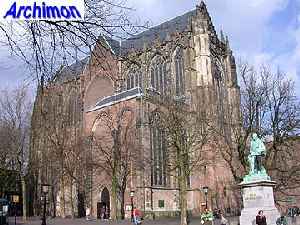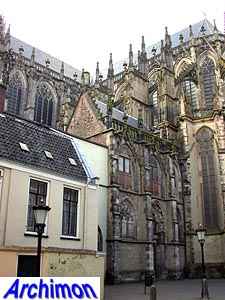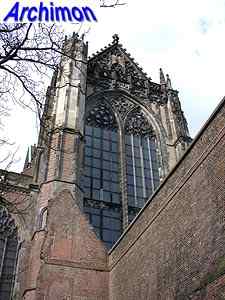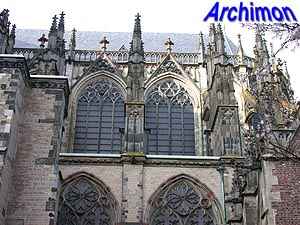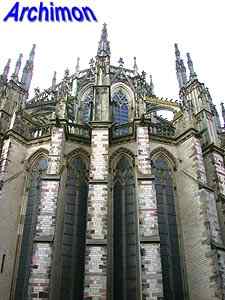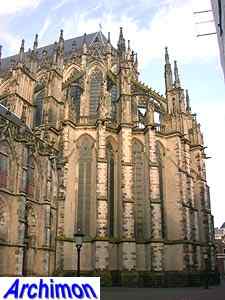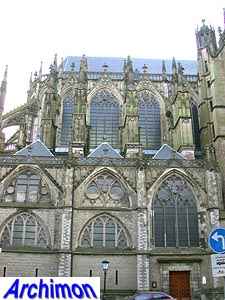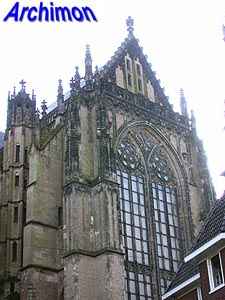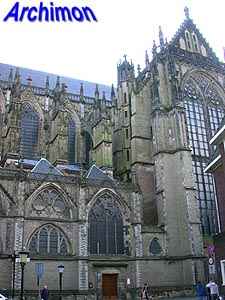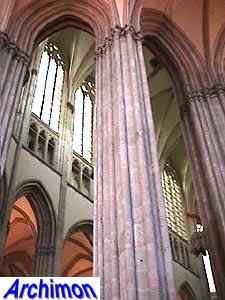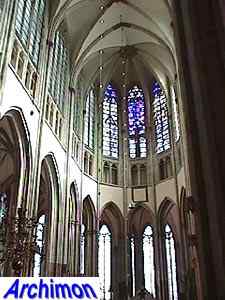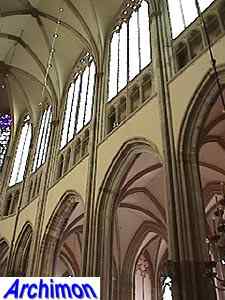
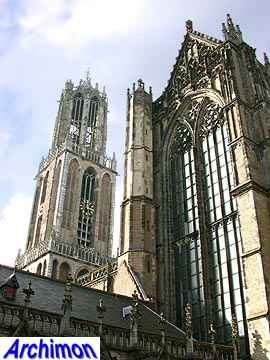 At
the location of the former Roman castellum several churches and
cathedrals have been built throughout Utrecht's long history.
Today only one of these is left. Once this was the country's
largest cathedral, dedicated to St. Martin of Tours, and the
one church in the Netherlands that closely resembles the original
French style that later became known as Gothic, even though in
contrast to its French examples it only has one tower. All other
Gothic churches in the Netherlands belong to one of the many
regional variants (see the Gothicism-section
for more information). The church is usually referred to as the
Dom.
At
the location of the former Roman castellum several churches and
cathedrals have been built throughout Utrecht's long history.
Today only one of these is left. Once this was the country's
largest cathedral, dedicated to St. Martin of Tours, and the
one church in the Netherlands that closely resembles the original
French style that later became known as Gothic, even though in
contrast to its French examples it only has one tower. All other
Gothic churches in the Netherlands belong to one of the many
regional variants (see the Gothicism-section
for more information). The church is usually referred to as the
Dom.
Building took place from 1254 until well into the 16th century.
But calvinism came and took its toll. In 1572, during a wave
of calvinist inspired vandalism that spread all over the Low
Countries, much of the ornaments on both exterior and interior
were destroyed, and when the church was finally taken from the
catholics and given to the protestants much of the enormous building
was neglected and left to fall apart, and so it did. The still
unfinished and insufficiently supported nave collapsed in a storm
of 1674. All that remains are the transept and the tower. Where
the rest of the cathedral used to stand is now a square, and
differently colored stones indicate the original outlines of
the church, and of its predecessors.
The tower was built in the same period as the church. It is 112
metres tall and it is clear that already soon after its completion
this tower was considered of great importance, considering the
fact that it inspired a whole new style of towers (see the Gothicism-section),
although these towers usually are much more decorated. The lower
part of this tower has very few decorative elements. The high
gate in this lowest portion of the tower probably was intended
as the church's main entrance. But even in the cathedral's most
complete form, the tower and the nave were not connected, at
least not on the ground. The chapter of the adjacent St. Salvator
church demanded that the path leading to their church remained
accessible, and therefore tower and church have always been two
seperate objects, with only a chapel forming a bridge between
the two. That chapel was removed long ago, but inside the tower
are two more chapels. At various places at the buildings exterior
traces can be found of the iconoclastic rage of 1572 and small
portions of the ruined nave. Even though the various restorations
of this building have often been criticized, these silent witnesses
of history have been maintained. If this church had been returned
to the catholics these probably would have been hidden by a reconstruction
of the vanished part. Instead of an incomplete but truly medieval
Gothic church, there probably would have been a complete but
mostly neo-Gothic 19th-century church now.
